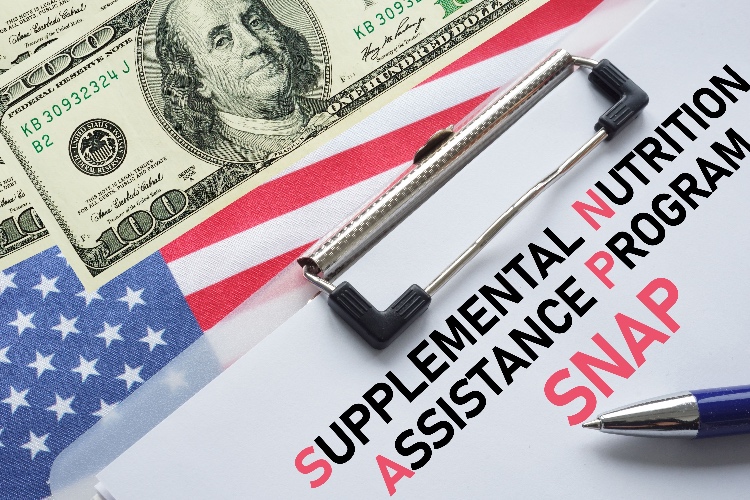
Food security is one of the most basic needs for health and peace of mind, especially for older adults living on fixed incomes. When news breaks about possible changes to food assistance programs, it’s natural to feel uncertain. Right now, that concern centers on SNAP, the Supplemental Nutrition Assistance Program, which provides monthly grocery benefits to roughly 42 million Americans.
The ongoing federal government shutdown could temporarily disrupt SNAP funding if a resolution isn’t reached soon. While that sounds alarming, experts emphasize that the situation is still developing and that contingency plans may prevent major interruptions.
For seniors who depend on SNAP, staying calm, informed, and prepared is key.
Table of Contents
- What’s Happening with SNAP Right Now
- Why This Situation Matters for Seniors
- What to Expect If Funding Is Delayed
- How to Prepare and Protect Your Food Access
- Where to Find Help and Reliable Information
- Staying Grounded During Uncertain Times
- Emotional Support and Guidance with Blue Moon Senior Counseling
- Frequently Asked Questions
What’s Happening with SNAP Right Now
As of late October 2025, the U.S. Department of Agriculture (USDA) has warned that SNAP funding could be impacted starting November 1 if the federal government shutdown continues. The concern stems from temporary funding shortages that might delay benefit distributions to states.
While uncertainty remains, it’s important to note that SNAP has contingency reserves, emergency funds that can keep benefits flowing for a limited period. Many states are already preparing to manage their own short-term responses to avoid immediate interruptions.
In short: benefits are still being distributed, but seniors who rely on SNAP should stay alert for state-level updates and prepare for possible short-term changes.
Why This Situation Matters for Seniors
For many older adults, SNAP benefits make a real difference in maintaining good nutrition, especially with rising food costs. According to the USDA, more than 4.8 million seniors participate in SNAP, often receiving modest but essential monthly support.
Because older adults often face limited income and higher medical costs, even a small disruption can feel stressful. However, being informed allows seniors to make calm, confident choices, whether that means adjusting shopping schedules, exploring backup options, or seeking temporary help from community organizations.
This is also a time to remember that no one is alone in this. Many local and national programs are ready to assist if benefits are delayed or reduced.
What to Expect If Funding Is Delayed
If federal funding for SNAP temporarily lapses, a few things could occur:
- States might use reserve funds or emergency measures to continue issuing benefits.
- Payment schedules could shift slightly, causing short-term delays in when benefits appear on EBT cards.
- New applications or renewals might take longer to process during the shutdown.
Some states have already begun preparing for higher demand at food banks and community pantries in the event of a temporary gap. While no one can predict exactly how long the situation will last, there’s reason to believe that some level of support will continue through contingency measures or state action.
The key is to stay proactive, not fearful, keeping track of reliable updates and preparing modestly for short-term disruptions.
How to Prepare and Protect Your Food Access
Here are a few practical ways seniors can plan ahead and reduce stress:
- Keep an eye on your EBT balance and messages.
Check your SNAP account or card notifications regularly for updates about payment timing or benefit changes. - Stock smartly—not excessively.
Purchase affordable, shelf-stable foods such as rice, pasta, beans, canned vegetables, tuna, or peanut butter. Focus on items you already enjoy eating. - Plan balanced meals.
Try to include a mix of proteins, fruits, and grains. Many food banks and pantries offer fresh produce and frozen items, not just canned goods. - Connect with community resources early.
If you suspect your benefits might be delayed, contact local food banks, Meals on Wheels, or senior centers for assistance. Many are coordinating emergency plans during the shutdown. - Stay updated through trusted channels.
- USDA SNAP official updates
- Feeding America’s Food Bank Finder
- Your state’s Department of Health and Human Services or SNAP website
Where to Find Help and Reliable Information
If you need extra support during this time, several reliable organizations are ready to assist:
- Feeding America: Find food pantries and community meal programs near you.
- 211 Helpline: Dial 211 from any phone for free access to local food, utility, and social services.
- Area Agencies on Aging: These regional offices often offer home-delivered meals, grocery delivery, or application help for senior benefits.
- USDA SNAP Hotline: Call 1-800-221-5689 for questions about your benefits or eligibility.
If you’re unsure where to start, calling 211 is an excellent first step. Trained specialists can connect you to food programs in your area, often within minutes.
Staying Grounded During Uncertain Times
Uncertainty, especially around essential needs, can feel heavy. It’s normal to feel concerned, frustrated, or even helpless when something as critical as food access comes into question. But it helps to focus on what you can control: staying informed, reaching out for support, and maintaining healthy routines.
Try small grounding practices to manage stress:
- Keep a simple daily schedule to maintain normalcy.
- Limit how often you read news updates; once a day is usually enough.
- Share your feelings with family or friends, you don’t have to handle this alone.
- Practice mindfulness or light physical activity, like stretching or walking, to ease tension.
Taking care of your mental health during uncertain times is just as important as meeting physical needs.
Emotional Support and Guidance with Blue Moon Senior Counseling
Moments like this remind us that emotional resilience matters. At Blue Moon Senior Counseling, our licensed therapists specialize in helping older adults manage anxiety, stress, and life transitions with compassion and understanding.
We do not handle SNAP applications or financial aid, but we help seniors cope with uncertainty, build calm routines, and find hope when things feel unsettled. Whether you’re adjusting to financial challenges, dealing with health changes, or just need someone to talk to, we’re here to help.
If you’d like support navigating these times or simply want to talk through your worries, reach out to Blue Moon Senior Counseling today. Your emotional well-being is an important part of your overall health, and you don’t have to face uncertainty alone.
Frequently Asked Questions
- Are SNAP benefits ending?
No. SNAP is a federal entitlement program, meaning it’s designed to continue even during shutdowns. However, funding may be delayed if government operations remain paused for an extended period. - What should I do if my benefits don’t arrive on time?
Check your EBT card balance and your state’s SNAP website for updates. You can also call your local SNAP office or 211 for emergency food resources. - Should I buy extra food now?
It’s a good idea to have a few extra essentials, but there’s no need to panic-buy. Focus on affordable, nutritious foods that store well and fit your regular diet. - Where can I find help if my benefits stop temporarily?
Organizations like Feeding America, Meals on Wheels, and local food banks can help. You can also call 211 for guidance to nearby programs. - How can Blue Moon Senior Counseling help during this time?
Our licensed therapists provide emotional support for seniors dealing with stress, uncertainty, and life changes. We can help you strengthen coping skills, find peace of mind, and focus on what’s within your control.








